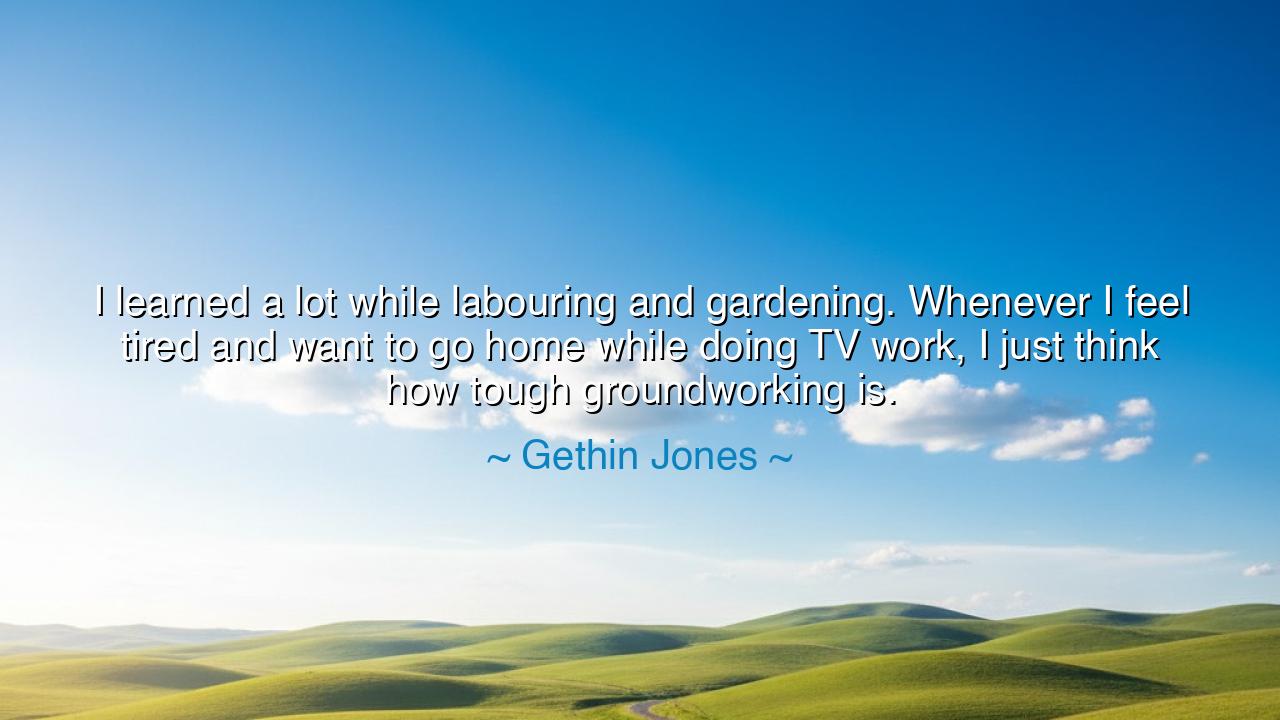
I learned a lot while labouring and gardening. Whenever I feel
I learned a lot while labouring and gardening. Whenever I feel tired and want to go home while doing TV work, I just think how tough groundworking is.






Hear, O children of wisdom, the words of Gethin Jones, whose reflections speak to the timeless virtue of hard work and the enduring strength of the human spirit: "I learned a lot while labouring and gardening. Whenever I feel tired and want to go home while doing TV work, I just think how tough groundworking is." In these words, Jones reveals a profound truth about the lessons we learn through manual labor—the type of work that connects us to the earth and teaches us about perseverance, patience, and the value of effort. He finds strength in the knowledge that the physical toil of gardening and groundwork is a form of training that not only shapes the body but also fortifies the mind.
In the ancient wisdom of the Greeks, the idea of labor was closely tied to the concept of virtue. Aristotle wrote extensively about the life of the active citizen, where he emphasized that true happiness comes not from idleness but from engagement with purposeful work. In his work, Nicomachean Ethics, Aristotle taught that one’s life must be filled with meaningful labor that contributes both to the community and to the individual’s growth. The labor of the land—whether it be farming or gardening—was viewed as one of the highest forms of work, for it directly connected humans to nature and to the earth’s cycles, teaching the value of sustenance, effort, and gratitude for the land that provides.
Similarly, in the ancient texts of India, the Bhagavad Gita speaks to the importance of duty, or dharma, and how every individual must fulfill their responsibilities, not for personal gain but as part of the greater order. Arjuna, the warrior, learns from Lord Krishna that true fulfillment comes not from avoiding hard work but from embracing it as a sacred duty, one that is part of the fabric of existence. Whether gardening, plowing, or gathering food, these acts were seen as divine work, where the laborer was in harmony with the earth’s rhythm and the divine will. Jones' words echo this teaching, for his acknowledgment of the toughness of groundwork reminds us that hard work, even when difficult, holds deep value and meaning.
Consider, O children, the life of Booker T. Washington, a man born into slavery, who rose through sheer effort and hard work to become an influential educator and leader. Washington understood deeply the value of manual labor, and he built his own life on the principles of self-reliance and diligence. In his autobiography, Up From Slavery, he speaks of his early years spent working the land, learning that the discipline of labor was a foundation for both personal growth and community service. For Washington, every task, no matter how humble, was an opportunity to build character and grow stronger. Jones' reflection on the challenges of gardening resonates with Washington’s belief that hard labor teaches lessons that no other experience can impart.
The lesson, O children, is clear: hard work—whether it is in gardening, farming, or manual labor—is not just about the physical effort, but about building resilience, patience, and perseverance. When we find ourselves weary in our modern tasks, we can draw strength from the knowledge that every effort, no matter how small or mundane, is part of a greater cycle of growth and renewal. Groundwork, as Jones mentions, is a reminder of the value of sweat and toil, and how these efforts not only contribute to the world but also help to shape our character.
Let us, O children, learn from the wisdom of those who have worked the land, from the lessons of gardening, and from the sacrifices and efforts of those who have come before us. When faced with challenges, whether in work or in life, let us remember that tough tasks are not burdens but opportunities for growth. Embrace the labor of your hands, for through it, you will learn the strength of your body and the resilience of your soul. Gardening, like all work, is not merely a means of sustenance; it is a spiritual practice, where we learn the rhythms of the earth and discover the deeper meaning of dedication and effort.
What, then, should we do with this wisdom, O children of wisdom? We must embrace work, whether it is physical or intellectual, as an opportunity to grow. Recognize that labor—whether gardening or any other form—teaches us lessons about ourselves: about resilience, patience, and strength. When you feel weary, turn to the knowledge that every effort contributes to your personal development, and know that your hard work is a sacred offering that connects you with the cycles of life and the divine order of the universe.






AAdministratorAdministrator
Welcome, honored guests. Please leave a comment, we will respond soon